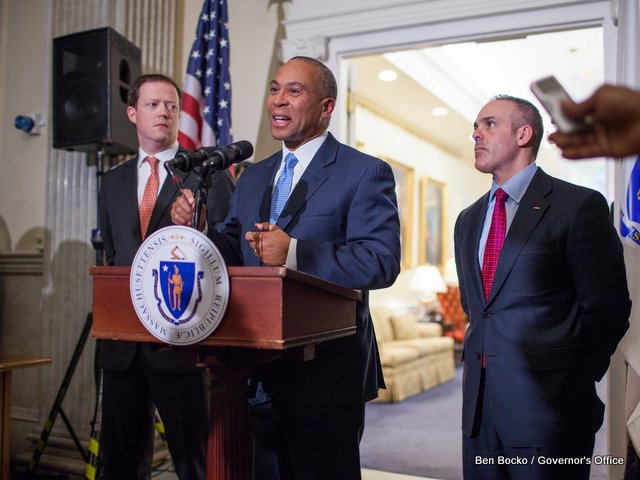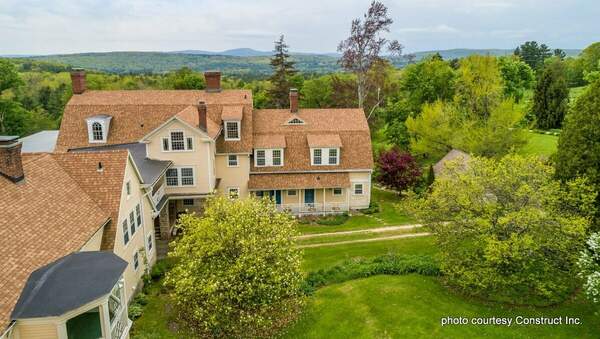Patrick: Legislature's Plan Leaves Out WMass Projects
|
Gov. Deval Patrick on Thursday said he would veto a $500 million transportation plan being proposed by legislative leaders. The governor has been pushing a more ambitious 10-year spending program. |
NORTH ADAMS, Mass. — The governor on Friday afternoon reiterated his opposition to the $500 million transportation plan being put forth by the Legislature's leadership, calling it a "pretend solution" that fails to address infrastructure or education.
"We fix some of the key operating deficits and little else," said Gov. Deval Patrick during a phone conference with regional media. "... Not only does it shortchange every community outside of Boston and even Boston itself in terms of transportation, it shortchanges every parent or business owner who cares about the readiness of our young people for the work place."
In danger, he said, were not only capital improvements to the aging Massachusetts Bay Transit Authority, but transportation infrastructure projects in Western Massachusetts — including a proposed rail service from Pittsfield to New York City, the I-91 viaduct in Springfield and service expansion from the Berkshire Regional Transit Authority.
Patrick has presented a much more ambitious $1.9 billion proposal — reliant on raising the state income tax a percentage point and eliminating some deductions — to split between education and transportation. The plan includes more than $500 million this coming year alone for education, including $131 million for early childhood. The administration's transportation plan — more than $13 billion over 10 years — is designed to wipe out the MBTA debt and invest in dramatic upgrades in road, rail and bridges.
The governor threatened on Thursday to veto the transportation plan being supported by House Speaker Robert DeLeo and Senate President Therese Murray for $500 million to be raised in part by an additional gasoline tax of 3 cents (the first hike since 1991) and another $1 tax on cigarettes, and dedicating motor vehicle sales taxes ($130 million) to transportation.
The leadership's Transportation Finance Framework increases operating subsidies for the 15 regional transportation authorities by $80 million, also wipes out the MBTA's deficit and sees a 50 percent increase in Chapter 90 funds ($300 million).
DeLeo on Tuesday said the plan was financially sustainable and would not "overburden" families and business.
"We need a healthy transportation system to keep and grow jobs in Massachusetts," he said in announcing the proposal. "With this plan, we seek to provide adequate funding for the 21st century transportation system our economy needs while not overburdening the families and businesses of Massachusetts. It also helps maintain our strong financial standing, which lowers our borrowing costs when they arise."
|
|
Murray said it was based on "real needs." "Our No. 1 priority in creating this transportation financing framework was to determine what the actual gap is in our transportation system, or what the real need is, and how we can address it while also allowing for future investments in our transportation infrastructure," she said.
Proponents say the five-year plan is more than adequate in addressing needs, reducing the burden on taxpayers and increasing the capacity for future bonding on capital projects.
Patrick says it's the same short-sighted policy "that got us into this mess to begin with, the kind of pretend solution rather than a real solution."
Both plans contain "forward funding" rather than reimbursement for the RTAs, but Patrick said the Legislature's plan does not go far enough in providing money for expanded services and improvements. Transportation Secretary Richard A. Davey said the 15 RTAs will be splitting $12 million where the administration's plan provides for $100 million.
Patrick acknowledged raising taxes is difficult but said he was not wedded to a 1 percent income tax hike (sales tax would decrease under his plan.) He'd be willing to strike a compromise between income and "modest" gasoline tax increases.
The governor said polls have shown people were willing to consider a tax increase to see a modernization in the state's education and transportation infrastructure. But under the leadership's plan, the Berkshires would see a gas tax and little else, he said.
"The folks in Western Massachusetts will pay that gas tax and will see no change or improvement in their transportation service — none. Not in the RTA, not in the road and bridge work and certainly not in the connection of commuter rail to New York City."
The House is expected to take up the bill on Monday.
Tags: Berkshire Regional Transportation Authority, Legislature, state budget, transportation,
















